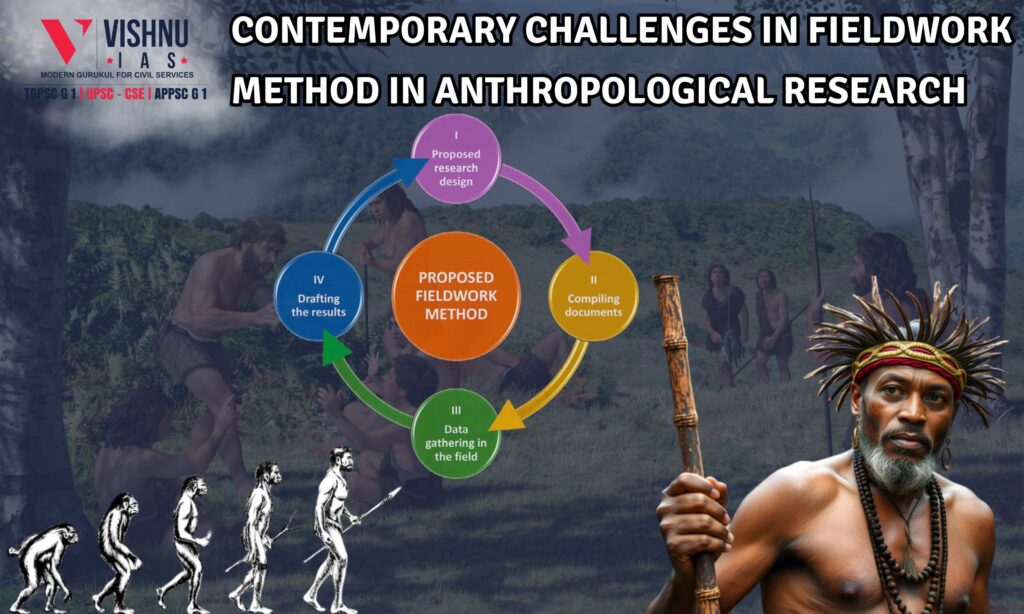Discuss the contemporary challenges in fieldwork method in anthropological research.
⦁ Introduction: Contextual significance of fieldwork tradition in few lines
⦁ Body: Comprehensive analysis about the contemporary challenges in fieldwork method in anthropological research
⦁ Conclusion: it must be in contemporary context
INTRODUCTION
⦁ Fieldwork is a cornerstone of anthropological research, providing in-depth insights into cultures, societies, and human behaviours.
⦁ The fieldwork tradition in anthropology has evolved significantly over time, adapting to changing academic, cultural, and technological contexts.
BODY
Fieldwork is a cornerstone of anthropological research, providing in-depth insights into cultures, societies, and human behaviours. However, contemporary anthropologists face several challenges that can complicate the fieldwork process. Here are some of the key challenges
1. Ethical Considerations
⦁ Informed Consent: Ensuring that participants fully understand the nature of the research and consent to participate can be challenging, especially in communities with different cultural norms and literacy levels.
⦁ Privacy and Confidentiality: Protecting the privacy of participants and maintaining confidentiality is crucial, but can be difficult in small communities where anonymity is hard to preserve.
⦁ Power Dynamics: Researchers must navigate power imbalances between themselves and the participants, ensuring that their presence does not exploit or harm the community.
2. Access and Trust
⦁ Gaining Access: Securing permission to enter and study a community can be difficult, particularly in politically unstable regions or areas with a history of exploitation by outsiders.
⦁ Building Trust: Establishing trust with participants is essential for gathering accurate data. This process can be time-consuming and may be hindered by historical mistrust of researchers.
3. Cultural Sensitivity
⦁ Cultural Barriers: Researchers must be culturally sensitive and aware of local customs, languages, and social norms. Misunderstandings can lead to conflicts and affect the quality of the data collected.
⦁ Ethnocentrism: Avoiding ethnocentric biases and ensuring that interpretations of data are culturally relative is a constant challenge.
4. Technological and Methodological Challenges
⦁ Digital Ethnography: The rise of digital technologies has introduced new methods such as online ethnography. While these methods offer new opportunities, they also present challenges in terms of data authenticity and participant engagement.
⦁ Multi-Sited Ethnography: Studying phenomena that span multiple locations requires researchers to adapt their methods and manage logistical complexities
5. Political and Environmental Factors
⦁ Political Instability: Conducting fieldwork in politically unstable regions can be dangerous and may limit access to certain areas or populations.
⦁ Environmental Challenges: Harsh environmental conditions, such as extreme weather or remote locations, can pose significant physical challenges to researchers.
6. Funding and Resources
⦁ Limited Funding: Securing adequate funding for fieldwork can be difficult, particularly for long-term or multi-sited studies. Limited resources can constrain the scope and depth of research.
⦁ Resource Allocation: Efficiently managing resources, including time, money, and equipment, is crucial for successful fieldwork.
Examples and Case Studies
⦁ Digital Ethnography: Researchers studying online communities or social media platforms must develop new strategies to engage participants and verify data authenticity.
⦁ Multi-Sited Ethnography: Anthropologists studying migration patterns may need to conduct fieldwork in multiple countries, each with its own set of challenges and cultural contexts.
CONCLUSION
⦁ Contemporary fieldwork in anthropology is fraught with challenges that require researchers to be adaptable, culturally sensitive, and ethically vigilant. By addressing these challenges, anthropologists can continue to produce valuable insights into human societies and cultures. Ongoing methodological innovations and ethical considerations are essential for the advancement of anthropological research.
Anthropology Full Course at Vishnu IAS Academy
What does Course Offer?
- 4 Months (250+ Class Hours)
- Online (App + Web) / Offline / Hybrid Mode of Classes
- Live + Recorded Videos Access For 1 Year
- 2 Hour Live Class From Monday to Saturday (1.5 Hours for Class + ½ Hour for Doubt Solving)
- Foundation to Advanced Level of Teaching
- Simple and Integrated Content
- One Stop Solution Books
- Regular Value Added Content
- Current Affairs & Case Studies Modules
- Daily Answer Writing Practice
- Weekly Grand Tests On Sundays & Evaluation With Guidance and Topper Will be Rewarded
- 500+ Model Answers
- 9 AM – 9 PM Support System
- Free GS Current Affairs
- Free Interview Guidance for Anthropology


